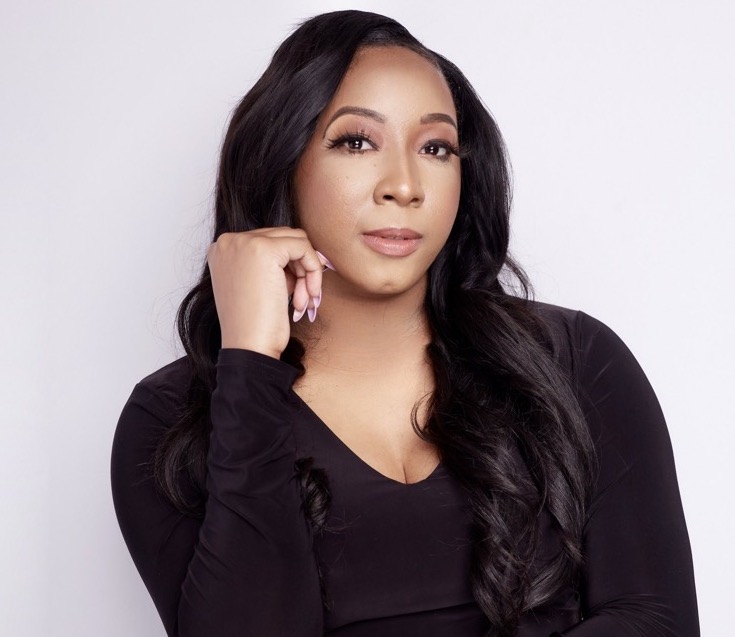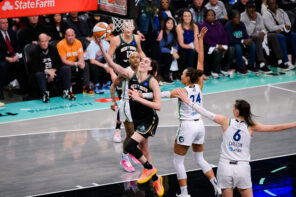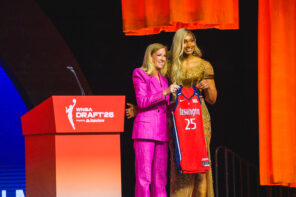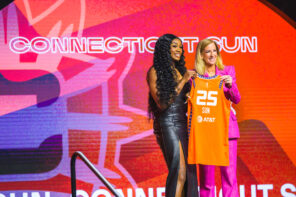WNBA Monday has become a tradition among fans. With our 12 teams taking time away from the court, there usually is a story that typically has fans buzzing in anticipation of the upcoming week’s slate of games.
That could be a dispute between a player and a coach, a WNBA luminary bringing attention to a league issue or someone making news on social media. With this past WNBA Monday also being Memorial Day, the W also did not stage its typical Monday Spaces on Twitter.
But this WNBA Monday hit a bit different.
Anyone who has followed what we do at Beyond The W over the years understands we are big fans of Khristina Williams, the founder of Girls Talk Sports TV. She has deservedly achieved many accolades in her career – including becoming a Forbes 30 Under 30 member and has established herself firmly as one of the most influential media figures in women’s sports.
Apparently, that has not stopped a few individuals who work at Howard Megdal’s The Next from throwing a bit of shade the way of Williams.
She posted screenshots of a Next group chat that apparently showed Eric Nemchock, Hunter Cruse and others attempting to sling mud at Williams.
Since then, Nemchock and Cruse have attempted to issue apologies for what was revealed in that Next group chat, but another by the name of Em Adler, attempted to say that the mark of a true journalist is one’s ability to attend every practice and game if possible.
Saying that Williams has not done the work of a real journalist is not only an unfair smear at her, but an unfair smear at every Black and/or Brown woman who covers the WNBA. Firstly, her resume speaks for itself from her appearances on MSG and SNY in New York City to establishing Girls Talk Sports to her Women’s Sports Wednesday Spotify Live show last season to her work with Athletes Unlimited.
Plus, her sources and relationships she has cultivated throughout the years enable her to be a reliable news breaker within the W space. She is just getting started.
But let us address this idea that one must attend “every game and practice” in order to be a true sports journalist. One has to understand that there are WNBA media individuals who cover the W from areas that are devoid of a team, making it a bit more challenging and financially taxing to get to practices and games.
Also, Kareem Copeland who covers the Mystics at the Washington Post and Annie Costabile who covers the Sky for the Chicago Sun-Times deserve their flowers for being able to travel to road games. But we still have plenty of work to do to ensure this is uniform throughout the WNBA’s media space meaning we need big money outlets to realize more women’s sports coverage makes good business sense as the Post and Sun-Times see.
Also – this smearing of “influencers” is the textbook definition of having one’s head in the sand. It is 2023 and social media is as every bit a dominant influence in our lives as cell phones themselves are. Many women’s basketball players at the professional, college and even high school levels themselves are influencers. This was particularly a hot-button topic around the Final Four when Brea Beal, Angel Reese and Deja Kelly were shouted out for being beauty influencers.
Here is the crux of why Adler, Nemchock, Cruse and others have issue with the Black and Brown women who cover the WNBA – they do it differently. Whether it is Williams, Ari Chambers, Terrika Foster-Brasby, LaChina Robinson, Greydy Diaz, our very own EIC Laureen “Lo” Edwards, Erica Ayala or Big Lo of TikTok fame, those Black women bring a different dimension to WNBA coverage by intersecting the game with the culture and style that Black women bring to the table.
And a side note for the Adlers, Nemchocks and Cruses of the world who could not help but let their hater flags fly … so much of covering a sport is about building relationships with those within said sport. Given the vast majority of WNBA players are Black women, which style of coverage do you think they are going to connect with more?
Just as our country would be up THE creek without the voices of Black and Brown women, the same applies to W coverage and for that we say thank you to those women for always being the lifeblood of WNBA coverage.
We said this before and will say it again until more individuals get it. The diversity and vibrancy of the WNBA press corps is what differentiates it from press corps from other sports. It has Black representation. It has Brown representation. It has LGBTQIA+ representation. It has AAPI representation. It has Native American representation. And it has white allies.
And we all bring something to the table – which is another reason why it is so disheartening that a few individuals believe covering the W ought to be more like a competition that is seen among press corps of other leagues.
Instead of embracing the idea that we all compliment one another and that all of us specialize in different avenues of covering the W (and the women’s sports realm as a whole), others want to be the ones to get every scoop, every breaking news story, every quote. That in a nutshell is unrealistic for any journalist covering any sport.
Williams and the other Black women who cover sports unfortunately understand all too well the disrespect that Black, Brown, AAPI, LGBTQIA+, Native American and White women allies receive. While the landscape of sports coverage is slowly, but surely, changing (and for the better), the sports realm is for the most part male dominant. Mostly still white male dominant. But, if anything, allow these words to be a counter to the mess uncovered via that Next group chat.
You belong.
It is somewhat tiring that we still have to defend the rightful place of Black, Brown, AAPI, LGBTQIA+, Native American and White women allies within the sports space in the year 2023. But we will continue to defend them as long as it takes.
And why will we continue to defend them? Not only because it is the right thing to do as they are human being when all is said and done. But we will continue to defend them because of the immeasurable value they bring to sports coverage as a whole.
They are the ones that bring a different perspective to sports than the tired old tropes we have been subjected to since the days before ESPN was established.
They are the ones that intersect sports with pop culture and understand that sports are merely one cog of society at large. They are the ones that refuse to “stick to sports” because they make other folks rightfully uncomfortable because those haters have to look the fallacies of their own cultures in the mirrors.
They bring their personalities, their backgrounds and their excellence with them every day they are on the job and are unapologetic about it.
They understand the struggles of having to be twice as good as their white male counterparts in America – and go above and beyond even being twice as good.
And yes…they are also doing so much of the work that drives sports coverage as a whole.
One of those screenshotted posts from that Next group chat “F off Khristina.” We say “Show off Khristina … all of the flowers you and other Black women have earned for being the backbone of the WNBA’s press corps.




